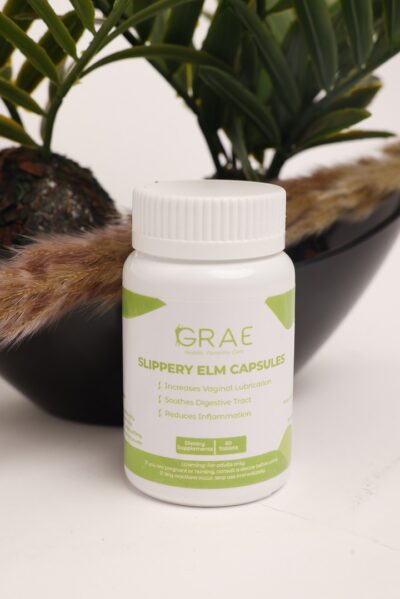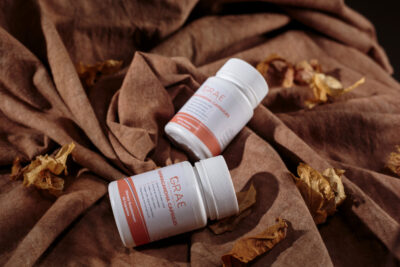Your cart is currently empty!
Many women struggle with vaginal dryness. One day you wake up and wonder, ‘why am I dry down there all of a sudden?’ There are home remedies for vaginal dryness that one can consider, from food, to lube to supplements. There are supplements to increase female lubrication. First, let us look at some of the causes of vaginal dryness in women.
Causes of vaginal dryness in women
Vaginal dryness, also known as vaginal atrophy or atrophic vaginitis, can have various causes, including:
Hormonal Changes: Fluctuations in hormone levels, particularly estrogen, are one of the primary causes of vaginal dryness in women. Estrogen helps maintain the health and lubrication of the vaginal tissues.
Menopause: The cessation of menstruation leads to a significant decline in estrogen levels, resulting in vaginal dryness and other symptoms such as vaginal itching, burning, and discomfort during intercourse.
Perimenopause: The transitional period before menopause can also involve hormonal fluctuations that lead to vaginal dryness and other symptoms.
Breastfeeding: Estrogen levels may decrease during breastfeeding, leading to vaginal dryness for some women.
Certain medical treatments: Hormonal treatments for conditions such as breast cancer or endometriosis may cause vaginal dryness as a side effect.
Diabetes: Poorly controlled diabetes can lead to vaginal dryness due to decreased circulation and nerve damage.
Vaginal infections: Infections such as yeast infections, bacterial vaginosis, or sexually transmitted infections (STIs) can cause vaginal dryness, along with other symptoms such as itching, burning, or abnormal discharge.
Allergies or sensitivities: Allergic reactions to certain products, such as douches, soaps, or laundry detergents, can irritate the vaginal tissues and lead to dryness.
Psychological Factors: Psychological factors such as stress, anxiety, depression, or relationship issues can affect sexual arousal and vaginal lubrication, leading to dryness during sexual activity.
Lifestyle Factors: Certain lifestyle habits, such as smoking, excessive alcohol consumption, or insufficient hydration, can contribute to vaginal dryness by affecting overall health and circulation.
Surgical Procedures: Surgeries that involve the removal of the ovaries or radiation therapy to the pelvic area can lead to decreased estrogen levels and vaginal dryness as a result.

How slippery elm helps with vaginal dryness
Slippery elm is a tree native to North America, and its inner bark has been used for centuries in traditional medicine for various purposes, including soothing mucous membranes and alleviating irritation.
Here is how slippery elm helps with vaginal dryness
Slippery elm helps the body produce more mucilage
Slippery elm contains mucilage, a gel-like substance that forms when the inner bark is mixed with water. Mucilage has lubricating and moisturizing properties, which could help alleviate vaginal dryness by providing a soothing coating to the vaginal walls and promoting moisture retention.
Slippery elm soothes the vaginal canal
Slippery elm has been traditionally used to soothe irritated mucous membranes, including those in the digestive tract and throat. Similarly, it might help calm any irritation or discomfort associated with vaginal dryness, providing relief and improving overall comfort.
Slippery elm has anti-inflammatory properties
Some research suggests that slippery elm may have anti-inflammatory properties, which could help reduce inflammation and irritation in the vaginal area. By calming inflammation, slippery elm may indirectly alleviate symptoms of vaginal dryness and discomfort.
Slippery elm helps support healthy microbiome
Supporting Healthy Microbiome: Maintaining a healthy vaginal microbiome is essential for vaginal health, including moisture balance. While there’s limited research on slippery elm’s effects on vaginal microbiota, its soothing properties might indirectly support a healthy environment for beneficial bacteria, which could contribute to vaginal moisture balance.
It’s important to note that while slippery elm may offer potential benefits for vaginal dryness, individual responses can vary, and more research is needed to fully understand its effectiveness and safety for this specific use. If you’re experiencing vaginal dryness or discomfort, it’s essential to consult with a healthcare professional for proper evaluation and personalized recommendations. They can help identify any underlying causes and suggest appropriate treatment options, which may include lubricants, moisturizers, hormonal therapies, or other interventions tailored to your needs.

How Ashwagandha helps with vaginal dryness
Stress Reduction: Chronic stress can negatively impact sexual health and arousal, leading to symptoms such as vaginal dryness. Ashwagandha is known for its stress-reducing properties and may help lower cortisol levels, the primary stress hormone. By promoting relaxation and reducing stress, ashwagandha could potentially improve sexual function and alleviate vaginal dryness associated with stress.
Hormonal Balance: Hormonal fluctuations, particularly during menopause or periods of hormonal imbalance, can contribute to vaginal dryness. While more research is needed, some studies suggest that ashwagandha may have hormone-balancing effects, potentially influencing estrogen and progesterone levels. By supporting hormonal balance, ashwagandha might indirectly help alleviate symptoms of vaginal dryness.
Libido Enhancement: Ashwagandha has been traditionally used as an aphrodisiac and sexual tonic in Ayurvedic medicine. Some research suggests that ashwagandha may enhance libido and sexual arousal in both men and women. By increasing sexual desire and arousal, ashwagandha might encourage natural lubrication and improve vaginal moisture levels.
Anti-inflammatory Effects: Chronic inflammation can contribute to vaginal dryness and discomfort. Ashwagandha exhibits anti-inflammatory properties and may help reduce inflammation throughout the body, including in the reproductive organs. By calming inflammation, ashwagandha could potentially alleviate symptoms of vaginal dryness and irritation.
Antioxidant Protection: Ashwagandha is rich in antioxidants, which help neutralize free radicals and protect cells from oxidative stress. Oxidative damage can affect vaginal tissues and contribute to symptoms of dryness and discomfort. By providing antioxidant protection, ashwagandha may support overall vaginal health and function.
While ashwagandha shows promise for supporting sexual wellness and potentially alleviating vaginal dryness, it’s important to consult with a healthcare professional before using it for this purpose, especially if you have any underlying health conditions or are taking medications. They can provide personalized guidance and help determine the most appropriate approach for addressing your specific needs.
Other remedies for vaginal dryness
Use Lubricants: Water-based or silicone-based lubricants can help reduce friction and discomfort during sexual activity. Apply lubricant to the genital area as needed to enhance moisture and comfort.
Use Vaginal Moisturizers: Vaginal moisturizers are designed to hydrate the vaginal tissues and provide long-lasting relief from dryness. Unlike lubricants, which are typically used during sexual activity, vaginal moisturizers are applied regularly, such as every few days or as directed by a healthcare professional.
Stay Hydrated: Drinking plenty of water helps maintain overall hydration levels in the body, including the vaginal tissues. Aim for at least eight glasses of water per day to support vaginal health and moisture balance.
Avoid Irritants: Avoid using products that may irritate the vaginal area, such as harsh soaps, scented hygiene products, douches, or perfumed lotions. Opt for gentle, fragrance-free products specifically formulated for sensitive skin.
Choose Breathable Underwear: Wearing breathable, cotton underwear allows air circulation and helps prevent moisture buildup, which can contribute to vaginal irritation and discomfort. Avoid tight-fitting clothing that can trap heat and moisture in the genital area.
Manage Stress: Chronic stress can exacerbate vaginal dryness and other symptoms of hormonal imbalance. Practice stress-reduction techniques such as mindfulness, deep breathing, yoga, or meditation to promote relaxation and hormonal balance.
Consult with a Healthcare Professional: If home remedies and over-the-counter products are not providing relief or if you’re experiencing persistent vaginal dryness, it’s crucial to consult with a healthcare professional. They can help identify any underlying causes and recommend appropriate treatment options tailored to your specific needs and health status.
Remember that every woman’s experience with vaginal dryness is unique, and what works for one person may not work for another. It’s essential to listen to your body, prioritize self-care, and seek guidance from a healthcare professional for personalized advice and treatment recommendations.

